Cizumab 400mg Bevacizumab Injection
$1,350.00 – $6,250.00Price range: $1,350.00 through $6,250.00
Cizumab 400 is used to treat various types of cancer, including colorectal, lung, kidney, ovarian, and cervical cancers. It contains Bevacizumab, which works by blocking the formation of new blood vessels that tumors need to grow and spread.
| Pack Size | Price | Price / Unit | Quantity | |
|---|---|---|---|---|
| 1 Injection | $1,350.00 | $1,350.00/ unit | ||
| 3 Injections | $3,900.00 | $1,300.00/ unit | ||
| 5 Injections | $6,250.00 | $1,250.00/ unit |
Looking for bulk / B2B pricing? | Send Inquiry |

| SKU | 11147 |
| Manufacturer | Hetero Healthcare |
| Categories | Anti Cancer |
| Delivery Time | 10 - 14 Working Days |
| Strength | 400mg |
Introduction to Cizumab 400 mg Injection
Cizumab 400 Solution for Infusion is an anti-cancer medication. It is used in the treatment of cancer of colon and rectum, non-small cell lung cancer, kidney cancer, brain tumor, ovarian and cervical cancer. It helps to prevent the growth of new blood vessels that feed tumors and stops tumors from growing. This medicine is manufactured by Hetero Drugs.
Cizumab 400 Solution for Infusion is an effective medicine, first-line option when used together with other cancer medicines. It is given as an infusion. That means you get it through a small needle in your vein or through a port, which is a device placed under your skin.
The doctor will decide your dose and duration and will check you for signs of an infusion reaction such as high blood pressure and trouble breathing. You keep taking Cizumab 400 Solution for Infusion as long as your disease is controlled and your side effects are manageable. Your doctor will determine whether you should stop taking it or not.
Uses of Cizumab 400 mg
- Cancer of colon and rectum
- Non-small cell lung cancer
- Kidney cancer
- Brain tumor
- Ovarian cancer
- Cervical cancer
How Does Cizumab 400 Works?
Cizumab 400 is a monoclonal antibody that targets PD-1 (programmed cell death protein 1), a checkpoint protein on immune cells. By blocking PD-1, Cizumab helps boost the immune system to recognize and attack cancer cells.
It works by preventing the cancer cells from “hiding” from the immune system, allowing T-cells to become activated and fight the tumor more effectively, especially in cancers like melanoma, lung, or kidney cancer.
Side Effects of Cizumab 400
Common Side Effects
- Fatigue
- Nausea
- High Blood Pressure
- Proteinuria
- Headache
- Nosebleeds
- Mouth Sores
Serious Side Effects
- Severe Bleeding
- Hypertension
- Impaired Wound Healing
- Proteinuria
- Impaired Kidney Function
Dosage of Cizumab 400 mg
Cizumab 400 mg Injection contains an active ingredient, Bevacizumab, which is used in the treatment of Cancer of colon & rectum, Non-small cell lung cancer, Brain tumor, Kidney cancer, Ovarian Cancer, Glioblastoma Multiforme, Cervical cancer, Peritoneal Cancer, Fallopian Tube Cancer.
This medicine is obtainable in different substitutes & strengths & has got to be purchased or taken on doctor’s prescription only. You must talk about with your physician for adjustment of dosage & time of the medicine since age & severity of the disease differ from person to person, and this can only be finest judged by your doctor.
Adults are advised to take Cizumab 400 mg Injection at a fixed time with or without food as instructed by your Doctor. You must take Cizumab 400 mg Injection regularly on time for better results.
How to Manage Side Effects?
- Monitor blood pressure regularly and report any significant changes to your doctor.
- Stay hydrated to help manage fatigue and prevent dehydration-related issues.
- Eat small, frequent meals to help manage nausea and maintain energy levels.
- Use a gentle skin care routine to soothe dryness or irritation caused by the treatment.
- Avoid injury or bleeding by using soft toothbrushes and gentle razors.
- Stay alert to signs of infection like fever, chills, or sore throat, and contact your doctor if they occur.
- Notify your doctor immediately if you experience severe abdominal pain, difficulty breathing, or sudden headaches.
Warnings & Precautions
Here are the Warnings & Precautions for Cizumab 400mg Injection (likely referring to Cemiplimab, a PD-1 inhibitor):
1. Immune System Activation:
- Cizumab can cause immune-related side effects like inflammation in various organs (e.g., lungs, liver, colon, or glands), which may require immediate treatment.
2. Infusion Reactions:
- Be prepared for possible allergic reactions during the infusion, such as fever, chills, or difficulty breathing.
3. Autoimmune Diseases:
- If you have a history of autoimmune conditions (e.g., rheumatoid arthritis, lupus), the drug could worsen symptoms.
4. Lung Problems:
- Can cause serious lung issues (pneumonitis)—watch for cough, chest pain, or difficulty breathing.
5. Liver Toxicity:
- May lead to liver damage—monitor for yellowing of the skin, dark urine, or severe fatigue.
6. Gastrointestinal Issues:
- Risk of colitis or inflammation of the intestines—report any persistent diarrhea or abdominal pain.
7. Pregnancy:
- May harm the fetus—avoid during pregnancy and breastfeeding.
8. Organ Transplant:
- Use with caution in patients with organ transplants due to the risk of organ rejection.
FAQs – Frequently Asked Questions
1. What kinds of cancer can Cizumab 400 Solution for Infusion be used for ?
Cizumab 400 Solution for Infusion is approved for the treatment of cancer of the colon or rectum that has spread to other parts of the body. It must be given along with chemotherapy. Other types of cancers that it helps with includes certain types of lung cancer, kidney cancer, ovarian cancer, cervical cancer, and glioblastoma (a type of brain tumor).
2. How is Cizumab 400 Solution for Infusion given?
Cizumab 400 Solution for Infusion is given as an infusion. That means you get it through a small needle in your vein or through a port, which is a device placed under your skin. Your doctor will decide your dose and duration and will monitor you for signs of an infusion reaction.
3. How long can I take Cizumab 400 Solution for Infusion for?
You keep taking Cizumab 400 Solution for Infusion as long as your disease is controlled and your side effects are manageable. Your doctor will determine whether you should stop taking Cizumab 400 Solution for Infusion. If your cancer progresses during this initial treatment, talk to your doctor if a different chemotherapy may be an option.
4. How Cizumab 400 Solution for Infusion works differently from chemotherapy?
Chemotherapy attacks fast-growing cells, like cancer cells. In contrast, the purpose of Cizumab 400 Solution for Infusion is to prevent the growth of new blood vessels that feed tumors. This causes the tumor to shrink, or to stop growing.
| Pack Size | 1 Injection, 5 Injections |
|---|---|
| Price/Unit | $1250/unit, $1300/unit, $1350/unit |
Be the first to review “Cizumab 400mg Bevacizumab Injection” Cancel reply
Related Products
Anti Cancer
Anti Cancer
Anti Cancer
Anti Cancer

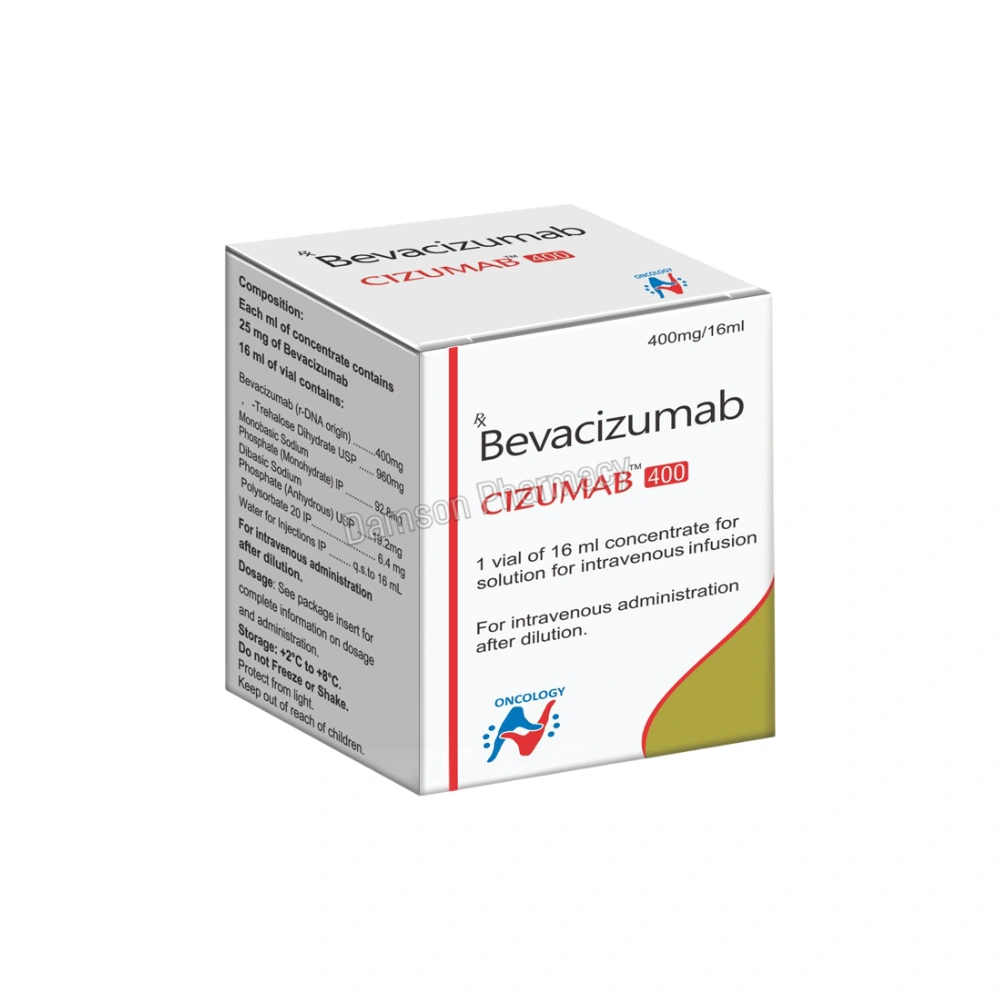
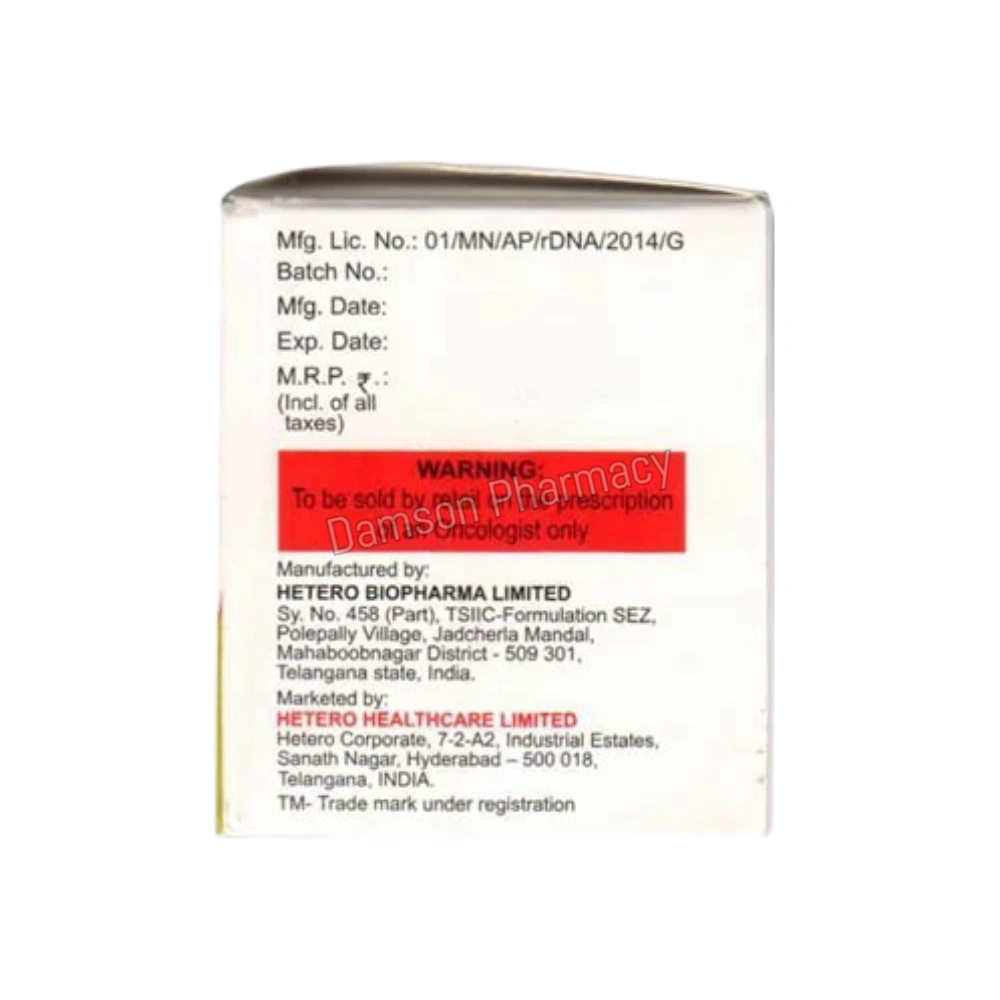
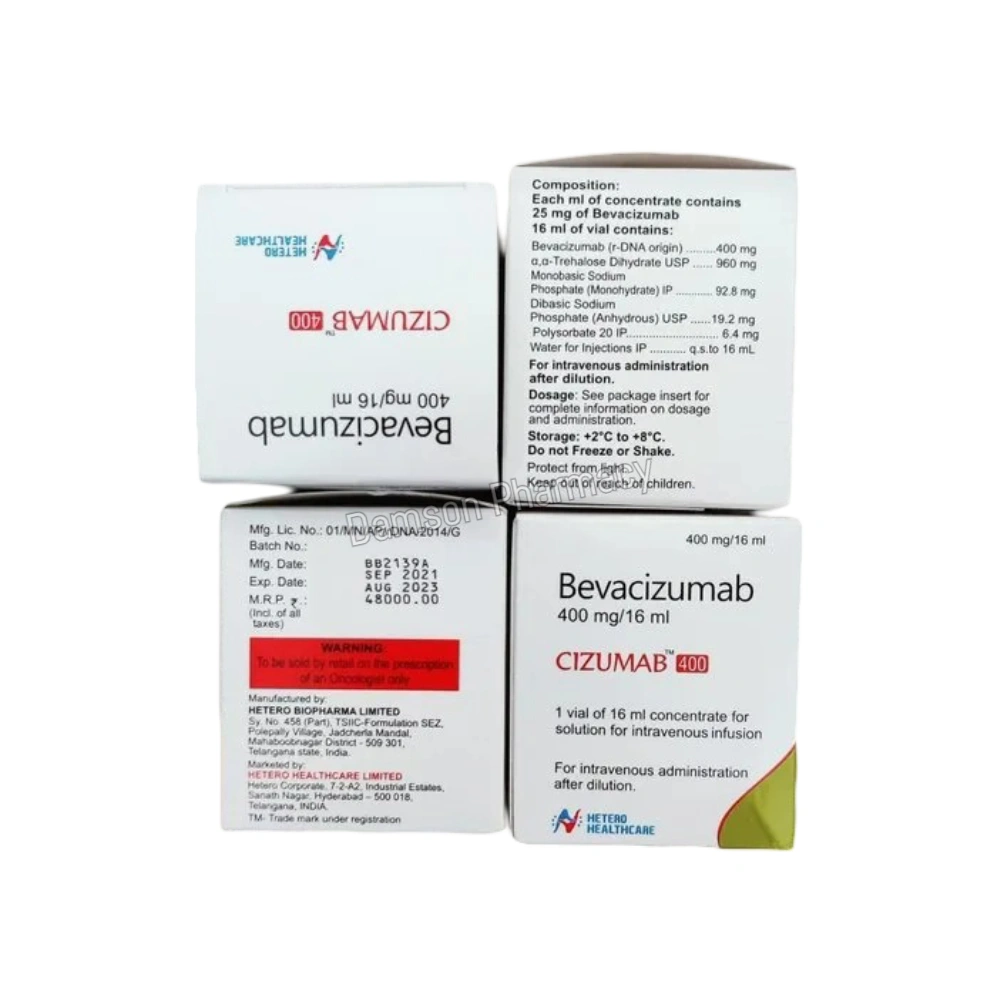
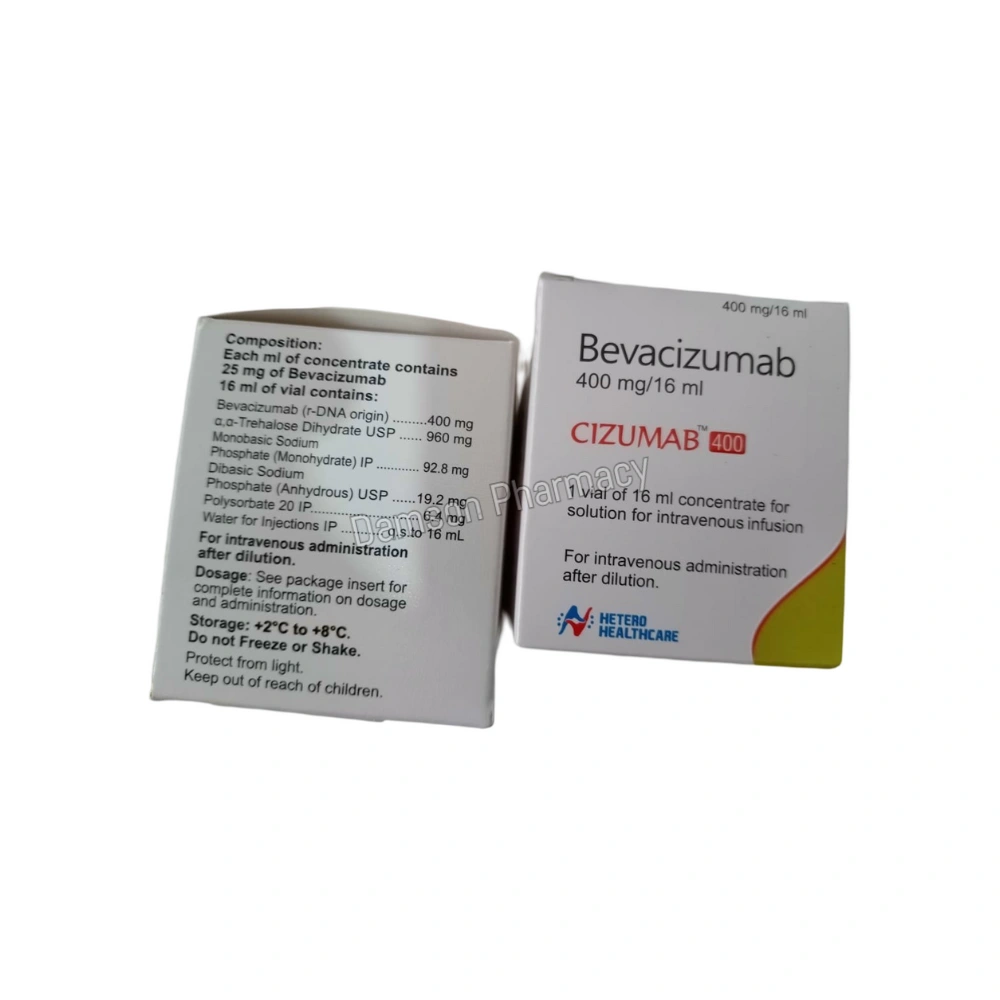
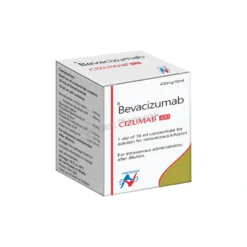
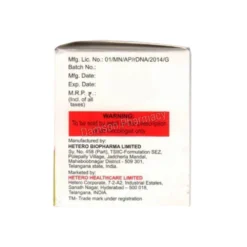
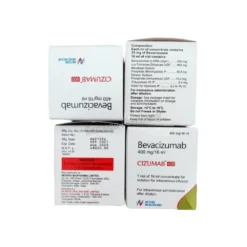

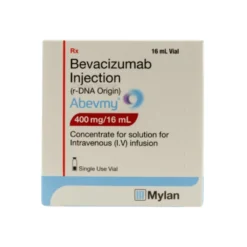



Reviews
There are no reviews yet.